Community Pairing Program
Purpose
The FHWA Vision Zero Community Pairing Program (Pairing Program) provides a platform for communities (cities, counties, MPOs, etc.) to help one another. The communities create and foster long-term partnerships to share information and noteworthy practices, assess strategies and actions, and forge beneficial learning relationships.
The Pairing Program features two types of partnerships. The first type is a mentor-mentee partnership in which a more experienced Vision Zero community is paired with a less experienced one. In this partnership, the mentee community receives a learning opportunity from the mentor community, and the mentor community may learn new ideas to improve its current Vision Zero related activities. The second type is a peer partnership in which both communities learn from one another and use one another as a sounding board to address their safety concerns and work toward their Vision Zero goals.
The FHWA adapted select elements from a model in North Carolina. This model focuses on collaborative Vision Zero planning and work, which the University of Carolina at Chapel Hill has been developing for the past several years.
The FHWA started the Pairing Program in 2022 with a pilot. After the successful pilot, the agency advanced the program in 2023. Since then, there have been two cohorts, 2023 and 2024.
Components
Pair Work Plan – Each pair/group develops a 2-year work plan as a guide to work together. This plan can be a “living” document.
Discussions and other meetings - Throughout the program, each pair/group holds regular virtual discussions (at the least, monthly) on topics identified in the work plan and/or emerging topics. FHWA encourages communities to invite one another to join virtual events that their departments or other departments host. These events are opportunities to learn about their partners’ Vision Zero and related efforts.
Quarterly Forum - On a quarterly basis, the entire cohort meets virtually in a forum to discuss safety efforts the communities lead. One or two communities kick off each forum with a short presentation(s) on specific topics of common interest. The forum continues with a facilitated conversation, in which all participants are encouraged to share experiences and practices, present challenges, and learn from one another possible ways to address the challenges.
Regular Check-in with FHWA – Three times during the first year, each pair/group virtually meets with FHWA to discuss progress, address challenges and opportunities, and report on other relevant matters. During the second year, the pair/group meets with FHWA at the end of the sixth month and at the end of the program.
In-person Visits – The FHWA supports up to two-person trips per community to visit its partner’s community. FHWA covers government-rate transportation and lodging expenses, and per diem during the trip.
The in-person events allow for real and lively exchanges of ideas and experiences. They also provide opportunities to visit work sites and meet with staff from different key departments. These visits also strengthen the bond between the paired communities and create sounding board opportunity to address challenges that each community faces.
- Read a summary of one of these visits.
- Read about the meeting between leadership and staff from the City of Boston and the City of Hoboken in Hoboken, NJ: Boston's visit in Hoboken.
Virtual Mini Peer Exchange – Toward the end of the program, FHWA brings the cohort together for a mini peer exchange. During this time, participating communities discuss the progress they have made in their Vision Zero efforts throughout the previous year and the work they have done with their partner, amongst other topics.
Timeline
Each pair/group and cohort work together in a two-year period. Even though FHWA does not provide support after the program ends, FHWA encourages the participants to remain in touch with one another.
Participants
Multiple community types (city, county, MPO, etc.) can be considered in this pilot, including communities who are still in the exploration phase of Vision Zero ranging all the way through those at full implementation. Communities that are still in the exploration phase of Vision Zero implementation must be able to demonstrate a partnership with at least one other sector of their community that shares a commitment to implementing Vision Zero (e.g., transportation and public health sectors). These communities are likely placed in the mentoring type partnerships.
There were three pairs of communities in the 2022 pilot:
- Richmond, VA - Tampa, FL
- Portland, OR - Minneapolis, MN
- Metro (Portland area MPO), OR - Broward County MPO, FL
The 2023 cohort increased to five pairs and one three-partner group:
- Daly City/San Mateo County, CA - Deerfield Beach, FL
- Richmond, VA - Trenton, NJ
- Bellevue, WA - Houston, TX
- Boston, MA - Hoboken, NJ
- DRCOG (Denver Regional Council of Governments), CO - Metro (Portland area MPO), OR
- New York City, NY - Greensboro, NC - Alameda, CA
The 2024 cohort includes six pairs and one three-partner group:
- Madison, WI - Arlington Co, VA
- Atlanta, GA - Louisville, KY
- Longmont, CO - Lancaster, CA
- Los Angeles, CA - Las Vegas, NV
- Jersey City, NJ - Pittsburgh, PA
- RTC (Regional Transportation Commission of Southern Nevada), NV – ARC (Atlanta Regional Commission), GA
- New York City, NY - Prince George’s County, MD - Gainesville, FL
Review testimonials from current participants (with permission to share):
-
“…last week, the City Commission adopted the Vision Zero Master and Action Plans. This would not have been possible without the Community Pairing Program. Thank you so much for all your help and assistance.” Eric Power, City of Deerfield Beach, FL (from email message to FHWA).
-
“…the City of Bellevue, Washington and the City of Houston have been meeting virtually throughout 2023, and in May, Franz Loewenherz and Gillian Hagstrom spent time with us in Houston. While our visit to Bellevue [in September] was a nice break from the Texas heat, the real positive outcome was the vibrant knowledge sharing about Bellevue’s processes, practices, and programs that are working towards our shared goal of zero fatalities and serious injuries on our roadways.” Virginia Lynn, City of Houston, TX (excerpt from LinkedIn post).
-
"During our visit, I also had the opportunity to converse with Houston City Council Member David W. Robinson who shared his inspiring vision of a multimodal transportation system that prioritizes safety, economic vitality, and livability. I’m looking forward to welcoming our Houston colleagues to the City of Bellevue in the Fall and sharing with them how our community is advancing a Safe System approach to Vision Zero. We’re moving towards zero together." Franz Loewenherz, City of Bellevue, WA (excerpt from LinkedIn post).
Contact: Chimai N. Ngo, chimai.ngo@dot.gov
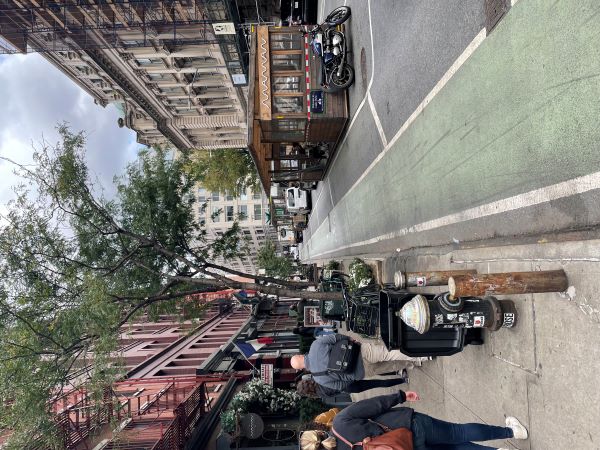
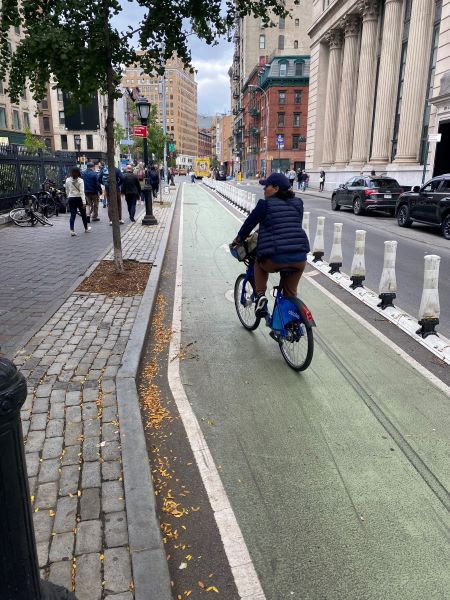
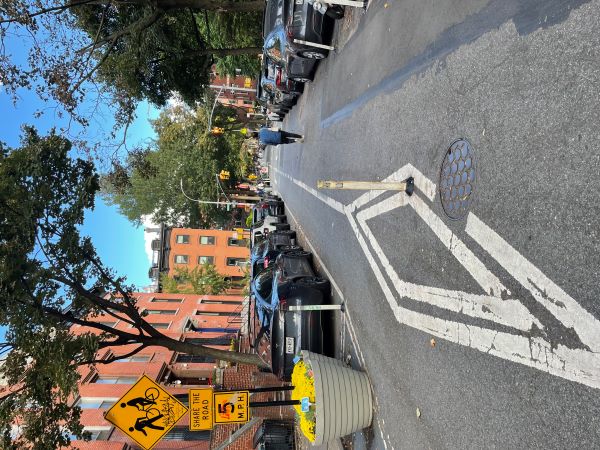
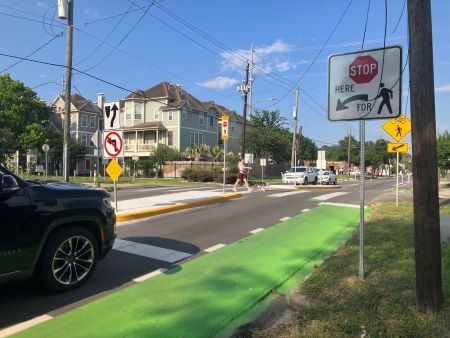

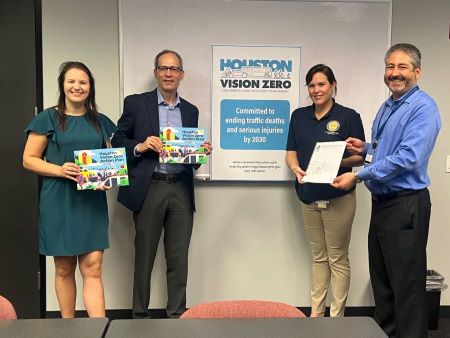
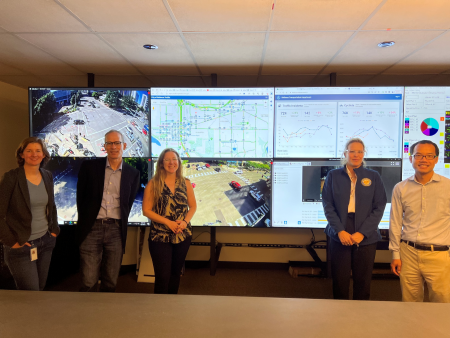
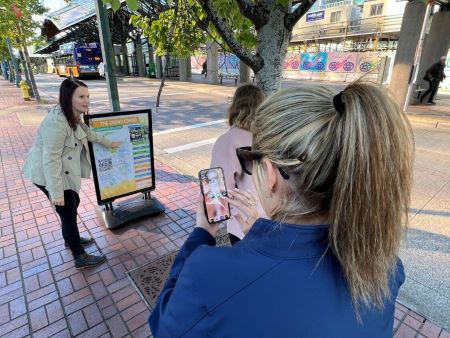
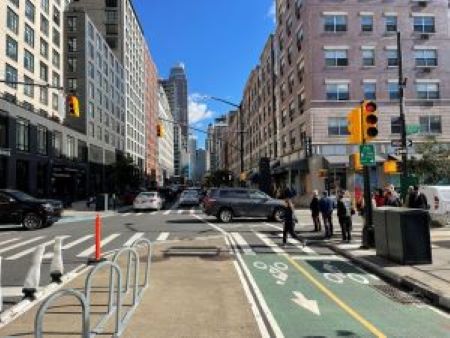
Photo credits (L to R): 1. City of Alameda, CA 2. City of Greensboro, SC 3. City of Alameda, CA 4.City of Bellevue, WA 5. City of Bellevue, WA 6. City of Houston, TX 7. City of Houston, TX, 8. City of Bellevue, WA, 9. City of Alameda, CA
